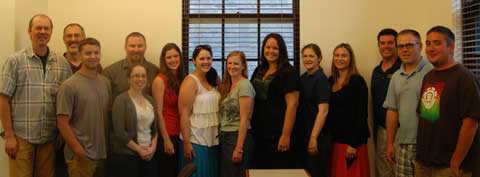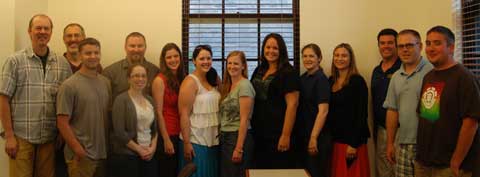KINGSTON, RI – August 13, 2013 – Math professors and graduate students at the University of Rhode Island are teaming up with high school seniors to give them extra help in math for a required state test.

About 60 students from Cranston East High School are attending a three-day math program, Aug. 13 through 15, on the Kingston campus that focuses on the basics of high school math: algebra, geometry and word problems.
The students also spent the summer taking online courses through Khan Academy, a nonprofit group that offers free education courses. Teaching assistants in URI’s math department worked with the students online.
“Honestly, this has been a wonderful experience,” says a 17-year-old Cranston East teenager who will be a senior next year. “I would suggest this for anyone who needs help with math. I’m confident I’ll get a much better score when I take the test again.”
The program is the brainchild of URI math professors and Cranston East administrators concerned about the high number of juniors who failed to earn a score of partial proficiency on the state test, called the New England Common Assessment Program or NECAP.
A few months ago, James Baglama, a URI math professor, and his friend, Christopher D’Ambrosio, assistant principal at Cranston East, got together to talk about how they could improve math NECAP scores for students.
D’Ambrosio says 43 percent of Cranston East juniors failed to earn an adequate score on the math section of the test. Baglama, along with his colleagues – Jessica Libertini, an assistant professor of math, and Cornelis de Groot, an associate professor in the School of Education – developed a program to help the students. The summer workshop was born.
“We need to do everything we can to give kids the opportunity to pass the NECAP,” says D’Ambrosio. “The URI program is a great way to start a collaboration between public school education and the state’s flagship public university.”
A 16-year-old Cranston East teenager enrolled in the program says he has no doubt that he’ll pass the math portion of the NECAP when he retakes the test this fall during his senior year, along with dozens of other students throughout the state who failed to get proficient scores.
The online classes he took this summer were excellent, he says, and he appreciated the personal tutoring from URI’s math teaching assistants, whom he communicated with online.
“It was a great experience doing the online classes,” he says. “You get a bunch of questions and answer them, and the help from URI was great. It made me think a lot.”
His confidence, he says, has soared. “I’ve been working on my weaknesses in math and just practicing, practicing, practicing. Any time I can get extra help on one of my weaknesses is always a plus.”
Baglama, Libertini and de Groot would like to expand the program to other high schools, perhaps with a grant. They say it’s important to identify and help students who need math help now, before they enter URI.
The three-day session at URI also includes a tour of the campus, including a visit to a chemistry lab and lunch at the Ram’s Den. Besides helping students with math, the goal is to get students excited about attending URI.
“This is a wonderful opportunity to expose students to the URI campus,” says Baglama. “It’s also a great way to help students build the skills necessary to transition from high school to the college classroom.”
Libertini agrees: “It is important that we affirm these students by creating a safe and friendly learning environment,” she says. “Students are working hard and practicing their mathematical skills, but more importantly, they are having fun, solving problems as teams, and engaging in healthy debates as they tackle a variety of challenges in preparation for retaking the NECAP in the fall.”
The NECAP has generated some controversy. Some organizations, students and parents are calling for an end to the test, arguing that it unfairly discriminates against urban and minority students. Poor NECAP scores might prevent about 4,000 students from graduating next year.
“We are trying to better prepare high school students for college level work,” says D’Ambrosio. “The URI program is the first step in developing a dialogue.”
Pictured above, from left to right: Cornelis de Groot, URI professor; James Baglama, URI professor; Ryan Dolan, URI undergraduate student; Mike Krul, URI lecturer; Erin Farrell, teaching assistant; Caitlin Phifer, teaching assistant; Diana Smith, teaching assistant; Jaclyn Cady, Cranston East teacher; Rachel Knowlton, Cranston East teacher; Jessica Libertini, URI professor; Nina DiIorio, Cranston East teacher; Chris D’Ambrosio, Cranston East assistant principal; John Fontaine, Cranston East teacher; Matthew Rodolewicz, Cranston East teacher.
Photo courtesy of URI math department.

